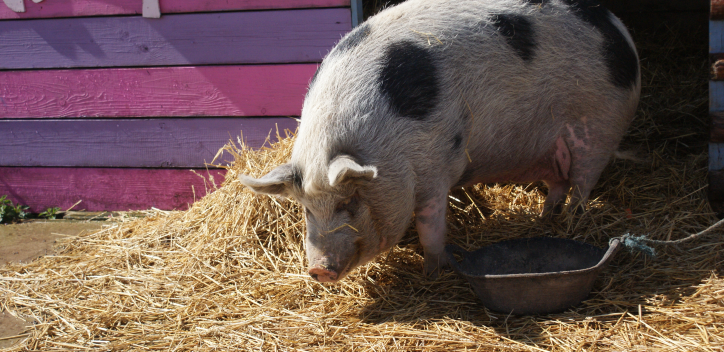The precision breeding act, passed earlier this year, permits changing the DNA of animals to increase production of animal products

What is precision breeding, and why does it matter to vegans?
Many farmers are unhappy about the stresses upon the animals they farm, as well as upon themselves. Despite this, animal agriculture industries are always seeking ways to maximise their profits and extract more value from non-human animals. A practice called ‘selective breeding’ has been used for centuries to create animals with more desirable traits to farmers, for example, producing more milk or putting on weight more quickly.
Precision breeding is, according to the Food Standards Agency, a way of changing the DNA of animals precisely, using techniques including gene-editing. It speeds up the selective breeding process, meaning that traits desirable to animal farmers can be maximised more quickly. This differs from genetically modified organisms (GM), as the changes produced through GM could never have been achieved through traditional breeding techniques.
Precision breeding in UK law
In March 2023 the UK government passed the precision breeding act, which permits precision bred plants and animals. They state that these technologies have the potential to increase disease resistance in crops, reduce pesticide use, lower costs to farmers and increase food production. The government states that the animal precision breeding law includes a system to safeguard animal welfare.
Such promises do not hold weight. Any ‘precision bred’ animals are highly likely to be subjected to early death, as is the case with the vast majority of animals exploited in the food system. Such suffering is unnecessary, as the use of non-human animals for food is not needed from a nutritional point of view. This is alongside the fact that animal farming causes suffering and contributes to environmental collapse.
Non-human animals are sentient; they are all individuals with their own feelings, abilities, personalities and preferences. Animals bred into the farming system lead short, uncomfortable lives in which they are not able to follow their natural instincts and behaviours. All animals deserve respect and compassion, but in the food industry they are treated as commodities rather than the individuals they are. Clearly, what is accepted as ‘animal welfare’ standards fall far below what these animals deserve.
Specific harms of precision breeding techniques
There are also specific harms that may arise from precision breeding technologies. Traditional breeding methods, such as selective breeding, has already created animals who suffer at the expense of the increased yield they produce. For example, chickens have been bred to lay hundreds of eggs per year, putting them at risk of osteoporosis and bone fractures. Dairy cows have been bred to produce the highest milk yield possible, causing many to suffer from lameness, mastitis and reproductive disorders. Visit our fact page to learn more about how cows and chickens suffer in the dairy and egg industries. Precision breeding risks only speeding up these issues which cause distress and suffering to so many animals.
In addition to this, the Wildlife and Countryside Link has said that precision breeding will have ‘complex consequences that are impossible to fully predict’ including ‘highly credible risks’.
Although precision plant breeding technologies may be valuable to help us endure until we reverse the climate change and biodiversity crises, there must be clear limits. In particular, we must respect our collective ethical commitment to avoid unnecessary harm and suffering in this sphere too. This means there must be no use of animals in the process, neither to insert animal genes into plants, nor to test the resulting ‘precision bred’ plant strains.
Vegan alternatives
Many have hailed the passing of the precision breeding law as a way to combat the climate crisis and feed more people. However, the best way to achieve these aims is to support farmers to transition to plant-based agriculture, as laid out by Harwatt and Hyack in their 2019 report Eating Away At Climate Change With Negative Emissions. Such techniques would help us to significantly increase food security, land management sustainability and resilience.
By transitioning to plant-based land management for food as well as industrial inputs, we can free up extensive land in the UK and beyond. Restoring UK natural forest cover maximises climate benefits. Relying less on fruit and vegetable imports, and producing more UK-grown plant-based foods aligns with public health goals and public demand.
The UK is a world-leader in sustainable plant-based land management techniques, pioneered by growers such as Iain Tolhurst and Jenny Hall, who have written a book entitled Growing Green – Organic Techniques for a Sustainable Future.
We need to see joined-up policy-making for food, farming, climate change, biodiversity, public health and the UK economy. Our report Planting Value in the Food System outlines how policy can support these crucial changes. We call on the government to start rapidly acting on this long-overdue need for plant-based land management, food and other industrial systems.
Find out about The Vegan Society’s Grow Green campaign, which aims to encourage a shift towards plant-based agriculture.